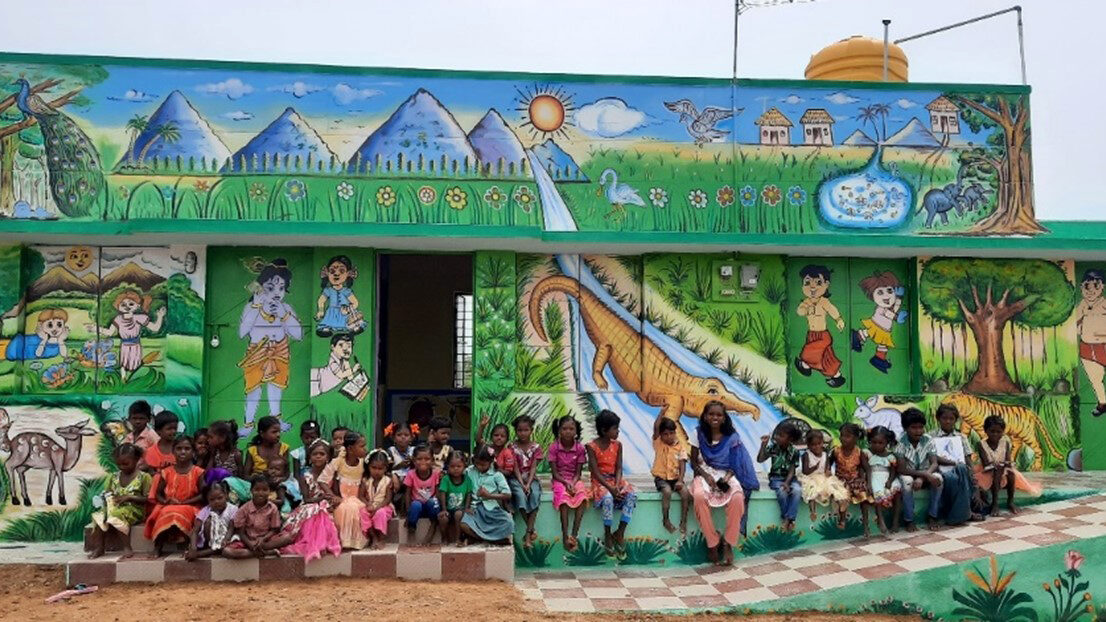Groundbreaking Planned Community Gives Survivors Security, Stability and Hope
Labor Trafficking
Meesanallur began in 2015 as a dream to help families of the Irula tribal community break cycles of poverty and trafficking for good. Over one hundred families are now flourishing in the innovative planned community in south India, modeling a scalable solution of how to protect vulnerable communities from violence and exploitation.
CHENNAI, INDIA –
Starting life over after bonded labor can be a daunting experience for many survivors—from the logistical challenges of finding work to the social challenges of neighbors understanding your trauma.
That’s why an innovative planned community in southern India has become such a paradise. Set up by creative government officials, the model village of Meesanallur is home to 143 families rebuilding together—with jobs, social programs, and trainings all tied to their unique needs.
Today, as life buzzes around the village’s bright-green concrete homes and small businesses, Meesanallur has become a promising prototype for rehabilitation whose success could impact millions of people across South Asia.
A first-of-its-kind, holistic community for survivors
The concept of this planned community began back in 2015, when IJM Chennai started working with Dr. Prabhu Shankar, a senior government official in Tamil Nadu, who was deeply compassionate toward people who have been marginalized. Particularly at risk were members of the Irula tribal group, who IJM estimates comprise almost 99% of the bonded labor victims in the state. As IJM’s team shared about bonded labor and the long-running challenges survivors face, Dr. Shankar began to dream of ways to help these families break cycles of poverty and abuse for good.
Dr. Shankar submitted a proposal to the government to establish a safe, integrated community for vulnerable families that would include concrete houses, small businesses, education facilities, recreational activities, and space for community trainings. He described, “It is not another ‘group house’ scheme for tribal persons, but a first-of-its-kind tribal colony in the country, with a focus on comprehensive intervention and sustainable livelihood measures.”
“One day is not enough to talk about Meesanallur. Once we worked in bondage, but in Meesanallur, we ourselves are the owners as well as the workers. For me, freedom means Meesanallur. We cannot find this happiness in any other place.”
– Pachaiyammal, survivor leader rescued from a rock quarry in 2012
The government approved his idea in July 2016 and provided more than $2 million to set up the “Smart Irula Colony Project” on six acres of land near Meesanallur village in Tiruvannamalai district, with homes for 43 families affected by devastating floods in 2015. In 2018, the government allotted another 101 additional acres to build 100 homes for more survivors of bonded labor.
Creating the new village involved collaboration between many partners. As the Tamil Nadu government managed construction and logistics, IJM worked with the Released Bonded Laborers Association to identify families who could best benefit from the project and encouraged them to move in. From there, IJM and Madras Christian College provided trainings and community-building workshops to help these families transition from lives in isolated poverty to stable, communal living in the village—covering cleanliness, education, alcohol abuse, domestic violence, child labor and child marriage. Families also learned financial skills—like the importance of saving—and how to steward their resources for future goals.
Profitable employment and a supportive community of peers have lead to breakthroughs in confidence
Today, all the homes are filled, and the survivor-run businesses are booming. The village’s charcoal-making unit and brick kiln turned their first big profits in early 2020, and survivors secured a dairy contract with one of the largest cooperative milk producers in the state. They have also set up a gas pump, a farm, a lumber unit, vegetable gardens, and a small shop for making paper goods. The steady work provided by these close-to-home businesses has kept many families stable throughout the COVID-19 pandemic; and many families are earning ten times what they were “paid” in bondage.
In addition to reliable income, the chance to live surrounded by other survivors—people who share the same life experience—has led to breakthrough confidence for many families. They have elected leaders amongst themselves to help the community run, and they feel united in their vision and inspired by one another to break their past cycles of abuse.
IJM staff have been thrilled to see the fruits of the Meesanallur project—from the proactivity of the government to the dedication of survivors sustaining the vision today. Even as the project changed hands when Dr. Shankar moved on, the model village has remained as a promising example of rehabilitation and ingenuity for survivors of bonded labor.
“We once worked in bondage to satisfy our hunger. But we are now living in freedom. Living in a concrete house is a big dream fulfilled in our lives. Meesanallur is a place where all our needs are met. One hundred houses for bonded laborers, pre-schools for our children, great employment opportunities and a community wedding hall—all in one place, which is an unimaginable dream come true.”
– Iyyappan, rescued from a woodcutting unit in 2019
IJM’s Director of Operations in Chennai Merlin Freeda shared, “The Tiruvannamalai government has pioneered in developing a project that not only improves the standard of living for the Irula community, but also safeguards them and the future generations from violence and exploitation—particularly from human trafficking and bonded labor.”
She added, “The Tamil Nadu government has declared their intent to end bonded labor in the state, and the Smart Colony Project for the Irula community has the makings of a scalable model that, when replicated across the districts of Tamil Nadu, will help prevent the occurrences of the aforementioned crimes. The holistic approach of the project ensures that all critical needs of people are met and that they remain protected.”